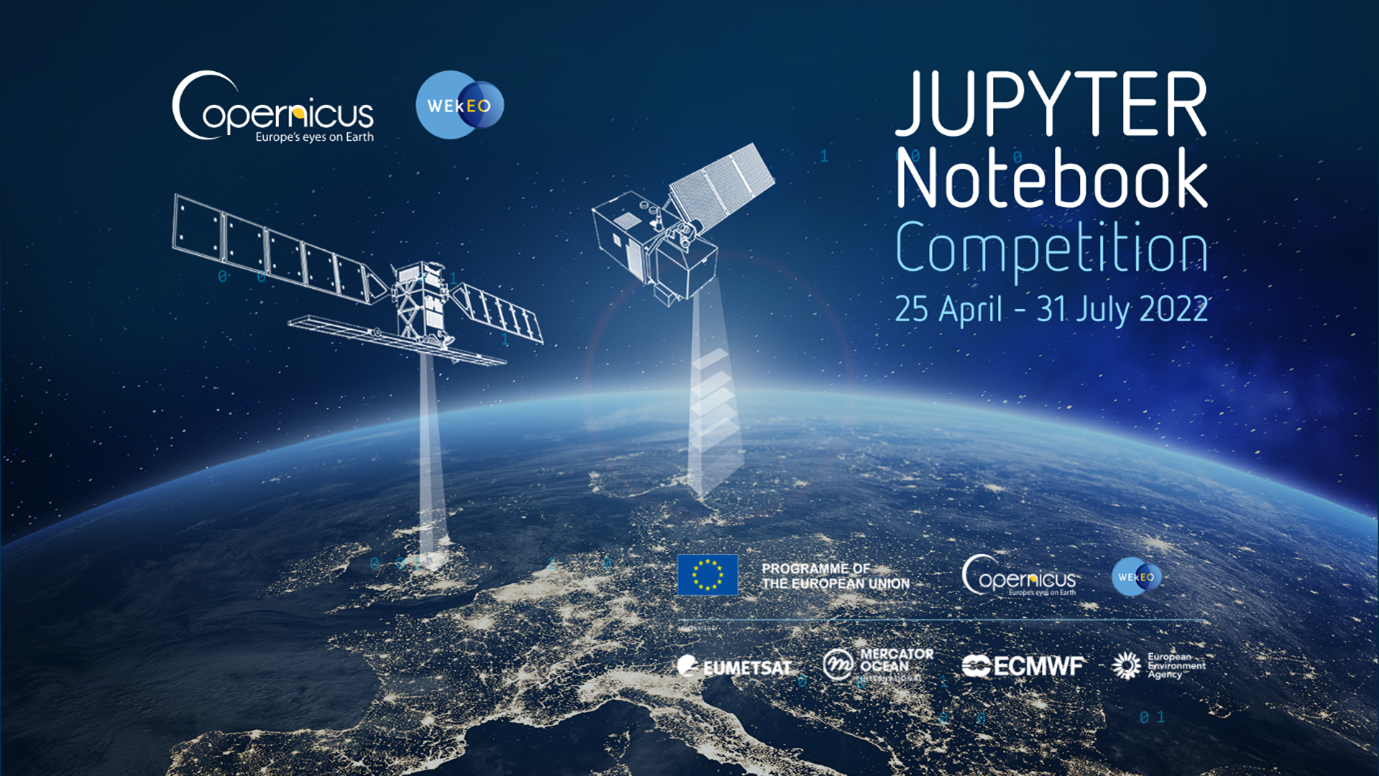Copernicus Jupyter Notebook Competition: Help others to start their journeys with EO data

Copernicus Jupyter Notebook Competition: Help others to start their journeys with EO data
motta@spacetec…
Thu, 12/05/2022 – 11:20
The onset of the humanity’s spacefaring era irreversibly changed our perspective on our planet. With the deployment of the first Earth Observation (EO) satellites came a paradigm shift to studying and tackling issues of global importance. Technological advancement has brought ever more complex space-based scientific instruments, vastly and rapidly increasing not just quantity and quality, but the availability of EO data and information. Europe’s Copernicus component of the EU Space programme is the world’s flagship Earth monitoring capability, producing in excess of 16 TB of data and information a day – available under a full, free and open access to the data policy – whose thematic lines span climate change, security and emergency management, as well as land, marine and atmospheric monitoring.
At the same time, we have been developing our ability to harness the power of this data and information; however, at no other point has the progress been as sharp as it is currently. The advent of modern techniques for processing and interpretation, such as Artificial Intelligence and Machine Learning, is not only important for the growth of Earth Observation, but necessary.
Several data and information access points, provide users of every kind – institutional, scientific, amateur, or commercial – access to the current of information being beamed down by Copernicus’ Sentinel satellites and provisioned by its services.
Copernicus Jupyter Notebook Competition
With climate change a core theme of the challenges currently facing scientists and legislators, it is more important than ever to be able to quickly and accurately interpret EO data. The past seven years, in particular, were the warmest on record – as outlined in the latest European State of the Climate 2021 report. As already noted, Copernicus offers a number of environmentally-oriented service lines. With more and more extreme temperatures, floods and mega-fires across the globe, satellite data is essential for scientists and decision-makers to study and adapt to the changes our climate and environment are undergoing. However, in order to stimulate interest in Earth Observation and encourage its uptake, better tools and resources must be developed to empower new users to start their own journey within the field.
One way of supporting newer users is increasing the availability of open access to software-sharing platforms, such as Jupyter Notebooks. These help bring down the barriers to entry currently holding back some prospective users, by reducing the friction of acquiring the required technical background. Jupyter Notebooks are open-source interactive web applications, which allow users to create documents – called notebooks – that contain live code, visualisations, equations, and narrative text. A very popular tool in helping people work with code, they contain both human-readable documents – containing the analysis description and the results (figures, tables, etc.), as well as executable documents that can be run to perform data analysis.
The new Jupyter Notebook Competition
While there are already Jupyter notebooks available on Earth Observation topics, there is a real need for more notebooks to help to stimulate new users and to drive innovation with Copernicus data and information. This is where the new Copernicus Jupyter Notebook Competition comes in! The competition is funded by Copernicus and has been developed by EUMETSAT as a joint project with ECMWF, Mercator Ocean International and the EEA. These organisations also operate the Copernicus WEkEO Data and Information Access Service platform.
Copernicus Jupyter Notebook Competition
The competition aims to bring together the knowledge and experience of experts to create a library of learning content for the future, paving the way for the next generation of data scientists and researchers who want to understand how to work with Earth Observation data. It is an opportunity for technology enthusiasts, researchers, students, or simply passionate people about data science and coding to use their skills to share an environmental story, a visualisation of climate data, or even a how-to on new machine learning techniques. Creativity is what is needed to better capture the potential of Copernicus environmental data. The ultimate goal of the Competition is to build a community-driven resource of notebooks on the Copernicus WEkEO online platform that will empower others to start their own journeys with Earth Observation data.
Participants can choose one of the four available tracks, coupled with land, marine, climate, or air quality thematic data. Later on, the solutions will be evaluated by a panel of independent judges, and the winning teams will be awarded cash prizes from a total pool of €5,000. This open-source library will undoubtedly expand big data analytics literacy in Earth Observation and data science, as well as kickstart training for the next generation of users.
Copernicus Jupyter Notebook Competition
To participate, there are simple steps:
Register for the competition
Select the track and thematic
Register on WEkEO to access Copernicus data
Develop, improve, and submit a final notebook
The Copernicus Jupyter Notebook Competition started on 25 April and runs until the close of its applications on 31 July at 16:59 CEST.
For more information check the official website of the Jupyter Notebook Competition: notebook.wekeo.eu
Thu, 12/05/2022 – 12:00


